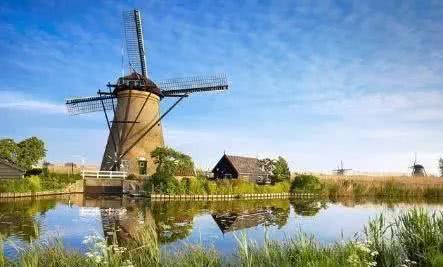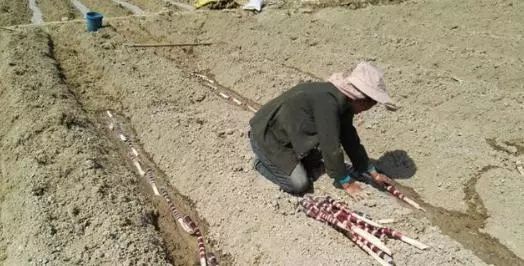How does the Netherlands, which is so small but the world's second-largest vegetable exporter, do so?

The first thing that reminds me of the Netherlands is tulips, especially when buying bouquets such as tulips, lilies and hyacinths. It seems that the Dutch vegetable planting industry is not only strong, but also the flower growing industry is very remarkable.
Why is Dutch agriculture so developed?
First of all, let's take a look at the geographical location of the Netherlands. The area of the Netherlands has already been mentioned. Only two and a half Beijing is large, with a population of more than 17 million. In fact, this is already a very large number for the Netherlands, with a high population density. In fact, this is very similar to the situation in our country, where there are a large number of people and little land.
The climate of the Netherlands belongs to temperate maritime climate, which is the same as that of New Zealand. The climate is warm in winter and cool in summer, the temperature is above zero all the year round, and the climate is humid and rainy. In fact, this climate characteristic is not suitable for the growth of food crops, but it is beneficial to the planting industry with less demand for light and heat conditions such as vegetables and flowers. This is in line with the Dutch vegetable industry.
The reasons for the Development of vegetable planting Industry in the Netherlands
1. High-tech vegetable growing
Look at many vegetable planting industries in China are rarely associated with high-tech these things, China's vegetable planting industry mainly depends on human extensive agriculture, and belongs to labor-intensive. However, countries such as Japan, Israel and the Netherlands, which are more developed in agricultural technology, apply high technology to agricultural cultivation, and belong to countries that regard agriculture as scientific research, especially the Netherlands.
The above analysis of the climate characteristics of the Netherlands shows that the light in the Netherlands is not sufficient and the land conditions are limited, which is very disadvantageous to the planting industry. However, in order to better develop agriculture, the Netherlands began to develop the greenhouse planting industry. Unlike China, the greenhouse in the Netherlands is mainly greenhouse greenhouse, they are mainly glass greenhouse. The automatic management mode is used in the greenhouse, and the agricultural planting is more efficient.
2. Strong intellectual support
Wageningen University and Research Center, which is the world's recognized capital of agricultural research. Every year, it transports a large number of talents for Dutch agriculture, constantly provides innovative ideas for the development of agriculture, and pushes the development of Dutch agriculture to the top level in the world.
3. The agricultural concept of harmonious coexistence between man and nature.
Although the Dutch agriculture has a high level of science and technology, the Netherlands highly values ecological nature in terms of planting concept. This makes the quality of the vegetable growing industry in the Netherlands higher, more in line with modern people's pursuit of a healthy diet, and is naturally very popular in the international market.
4. Convenient transportation and complete supporting facilities
The Netherlands is close to the Atlantic Ocean and the port transportation is very convenient. This is also a very convenient condition for the development of vegetable planting industry. And the Dutch planting industry is mainly planted by farmers, and many of them grow only one kind of vegetables, which is more beneficial for growers to accumulate experience and improve the quality of vegetables.
The above comes from promoting agriculture through science.
- Prev

When flowers meet coffee, it becomes the best life.
-- the most readable Wechat Flower Friends in the field of THE END-- "Flower Wild Nature" Flower Art: zouzaidalulogo Design: zouzaidalu Flower Aesthetics | Plant Aesthetics | Life Aesthetics | Plant & Flower Exploration.
- Next

Sugar cane is crisp, sweet and delicious, but have you ever seen sugarcane bloom? Do you know how sugarcane is planted?
Growing sugarcane is a rare thing for friends in the north, but it should be common for friends in the south. How on earth is sugarcane planted? I'll just have a chat with you here. Sugarcane seed sugarcane is not actually planted.
Related
- Wuhan Hospital Iron Tree Blooming Result Was Instantly Frightened by the Gardener Master
- Which variety of camellia is the most fragrant and best? Which one do you like best?
- What is the small blue coat, the breeding methods and matters needing attention of the succulent plant
- Dormancy time and maintenance management of succulent plants during dormancy
- Minas succulent how to raise, Minas succulent plant pictures
- What are the varieties of winter succulent plants
- How to raise succulent plants in twelve rolls? let's take a look at some experience of breeding twelve rolls.
- Attention should be paid to water control for succulent plants during dormant period (winter and summer)
- Watering experience of twelve rolls of succulent plants
- Techniques for fertilizing succulent plants. An article will let you know how to fertilize succulent plants.

